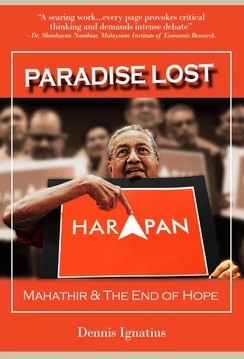 |
Paradise Lost: Mahathir & the End of Hope By Dennis Ignatius
Book Group 1 – Friday, October 28, 2022
What is the greatest challenge facing Malaysia today? Dennis Ignatius lists several but in his view, the forces of political Islam pose the greatest threat to the constitutional democracy of this country. Some of us see corruption as a close second.
Our book group read Paradise Lost: Mahathir & the End of Hope by Dennis Ignatius as our October choice. The book traces the impact of Mahathir’s leadership over his decades in office and outlines how Malaysia arrived at its present state. The ‘hope’ in the title is partially a play on Pakatan Harapan (PH, Alliance of Hope in English), the name of the political alliance that won in Malaysia’s 14th general election in 2018. As the PH leader, Mahathir became Prime Minister for the second time. Our fearless leader, Nisha, reached out to Ignatius and invited him to come and speak to our group at our monthly meeting. And he graciously accepted. So, it was a most informative morning as he shared with us his experiences and observations in his career as a member of Malaysia’s foreign service, Wisma Putera, in which he served as a career diplomat for 36 years. During this time, he also wrote newspaper columns on political events, which some of us remember.
|
|
One aspect of his book that intrigued us was the author’s search for a publisher and distributor. Needless to say, it was considered a hot potato by most of the publishers on the Malaysian scene, indeed too hot. He ended up publishing the book himself. Another stumbling block was finding a distributor. A problem he also solved by setting up a distributorship on his own. A search for a translator was fruitless. He found several who would translate his work but none would agree to having their name to appear on the book. Concerns about actions from the authorities were alleviated when he was told that as long as he didn’t translate it into Malay, he and his book would be safe.
Ignatius credits Mahathir with being one of Malaysia’s more capable leaders. He tells us the PM was always prepared for meetings, having gone through the details ahead of time, was comfortable with leaders, spoke forcefully for Malaysia’s position on world issues. On a personal level he found the politician to be kind, considerate, polite and soft spoken. This was not the side the nation saw.
The book looks at the various factors in play; politics, race and religion and other leaders. Ignatius portrays Mahathir as always having been a champion of Malay rights which guaranteed him constant Malay support but drew less enthusiasm from Malaysia’s other communities. Mahathir feels there will only be stability and prosperity for all when one Bangsa Malaysia has been achieved. In his mind this means all will follow Islam, speak Malay, adopting a Malay identity. People are not holding their breath.
Now that Malaysia has lowered the voting age to 18, will these new voters have an impact in this year’s election, GE15, and possibly change the political scene? Ignatius felt that since they only represent about 7% of the eligible 21 million voters, their influence will be minimal. He observed that the traditional divide in local politics with Malays representing the rural areas and Chinese the urban areas, is beginning to fade. More Malays now live in the cities and share general concerns with other urbanites. In fact, in a survey published in the Sunday Star this weekend (Oct. 30) of the top five issues of concern among both Malay and Chinese voters, four are the same. First for both is ‘cost of living and prices of goods’ and three other shared concerns are ‘political stability,’ ‘education’ and ‘education.’ The Chinese list ‘interracial relations’ while the Malays list ‘job opportunities and salary rates.’ So, the former sure-fire vote getter of political campaigns based on racial appeal no longer applies.
Asked about what he sees as the end point for Malaysia, he indicated he sees more of the same, getting worse. Much like the feeling one is left with at the end of his book, this is a very distressing outlook. His only hope is for something out of the ordinary happening to redeem the situation, something magical. It reminds me of the literary device, deus ex machina, in which an author introduces an unexpected event or power to save a seemingly hopeless situation, especially as a contrived plot device. So, let’s hope a miracle is waiting around the corner for us.
Kinokuniya, Gerak Budaya, Lazada, Shopee, Amazon
Leslie Muri |
|




